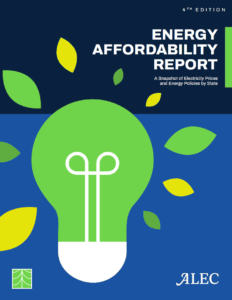Energy
Key Points
- The free market should be the principal determinant of which energy technologies reach the marketplace.
- Government programs designed to encourage and advance energy technologies should not reduce energy choices or supply. They should not limit the production of electricity, for example, to only politically preferable technologies.
- North America has extremely large reserves of fossil fuels. Access to these resources should be expanded to provide the U.S. with low-cost and reliable energy. Barriers limiting the use of and access to public lands should be removed.
- Energy security requires a diverse set of fuels to meet the demands of different geographic regions and different energy supplies.
It is difficult – and perhaps even impossible – to overstate the relationship between readily available access to safe, affordable and reliable energy and individual prosperity and economic wellbeing. This is because energy is an input to virtually everything we produce, consume and enjoy in society.
Think for a minute about the computer or tablet you are currently using to visit this website. Energy was needed in vast quantities in order to harvest the silica, petrochemicals, metals and other raw materials that make up your computer. Energy was needed again to turn these raw materials into something useful, such as computer chips, plastics and glass. Even more energy was needed to ship your computer to a retailer or directly to you. Finally, after years of use (which, of course, required plenty of electricity), energy is once again needed to recycle or dispose of your computer.
We, as Americans, take energy for granted. We expect computer manufacturers to continue producing devices without interruption. Similarly, when we routinely flip a switch, we expect the lights to come on without fail. It is perhaps only when the power goes out that we even think about where electricity comes from and the complex process by which it is delivered to us.
Because energy is so ubiquitous to our lives, it is critical that lawmakers implement market-oriented energy policies that allow energy to be produced more efficiently at lower costs with fewer economic disruptions and lower environmental impacts. If a state or federal government imposes overly onerous regulations or adopts policies that drive up energy costs, the effects will soon be felt throughout the entire economy. Food, medicine and other household goods will become more expensive almost immediately, disproportionately affecting those with low and fixed incomes.
Model Policies
-
Act To Lower Costs And Increase Reliability Of Electric Grids Draft
Section 1. Definitions On demand power” otherwise known as “dispatchable” power, means electricity from sources whose output is not weather dependent and can be controlled to meet changes in demand. “Intermittent generation” also known as non-dispatchable power, means electric generation that varies minute-to-minute…
-
Competitive Transmission and Permitting Reform Act Draft
Section 1. Short Title This Act shall be known as the Competitive Transmission and Permitting Reform Act. Section 2. Findings and Purpose The Legislature finds that: Competition in electric transmission development lowers costs for ratepayers and improves project delivery. …
-
Ending Rate of Return on Premature Closures Act Draft
Section 1. Definitions “Early Retired” means an electric plant that has ceased operations ahead of its originally planned, expected, or economically useful life span. “Stranded bond” means bonds or other financing, or unrealized amortized capital investment from an early retired electric plant. …
-
Statement of Principles on Establishing an Interstate Compact Regarding Competitively Bid Transmission Projects Draft
Statement of Principles Uniformity of Energy Types and Technologies. All aspects of the compact shall pertain equally to all energy generation methods. Ensuring that the compact is energy and technology neutral prevents any preferential treatment and maintains the integrity of the compact’s focus on developing free…
-
Ending Guaranteed Rate of Return on Government Subsidies Draft
Section 1. Definitions “Government Subsidies” mean money received from federal, state, and local governments for the building of electricity generation, storage, transmission, and carbon capture and storage, and generation of electricity by any of these. “Rate of return” means the additional amount that…
-
Resolution Directing Regional Transmission Organizations to Implement Electric Reliability Policies Draft
WHEREAS, the welfare of [STATE] citizens and its energy security and economic growth depend on a reliable, affordable, and resilient electric power supply; WHEREAS, the Federal Energy Regulatory Commission has expressed concerns about the reliability and stability of the regional and national electricity grid…
Press Releases
-

Energy Prices Impact Holiday Plans
Arlington, Va. – Today, the American Legislative Exchange Council (ALEC) is proud to announce the release of its 3rd annual Energy Affordability Report. A breakdown of energy prices throughout the country,…
-

New Report Finds Government Regulations Driving State Energy Costs Higher
Arlington, Va. (Sept. 29, 2022) – Today, the American Legislative Exchange Council (ALEC) released its Energy Affordability Report – 2nd Edition, which provides a snapshot of both electricity and gasoline…
-
New ALEC Report Analyzes Electricity Prices Across States
FOR IMMEDIATE RELEASE Contact: Alexis Jarrett Email: ajarrett@alec.org New ALEC Report Analyzes Electricity Prices Across States State energy policies can help or hurt…
-
ALEC Urges President and Federal Government to Consult with States on Energy Resources and Public Lands
FOR IMMEDIATE RELEASE Contact: Kaitlyn Buss Phone: 202-742-8526 Email: kbuss@alec.org ALEC Urges President and Federal Government to Consult with States on Energy Resources and Public Lands…
-
ALEC Disapproves of President Obama’s Decision on Keystone XL Pipeline
FOR IMMEDIATE RELEASE Contact: Kaitlyn Buss Phone: 202-742-8526 Email: kbuss@alec.org ALEC Disapproves of President Obama’s Decision on Keystone XL Pipeline Washington, D.C. (January 18, 2011)…







